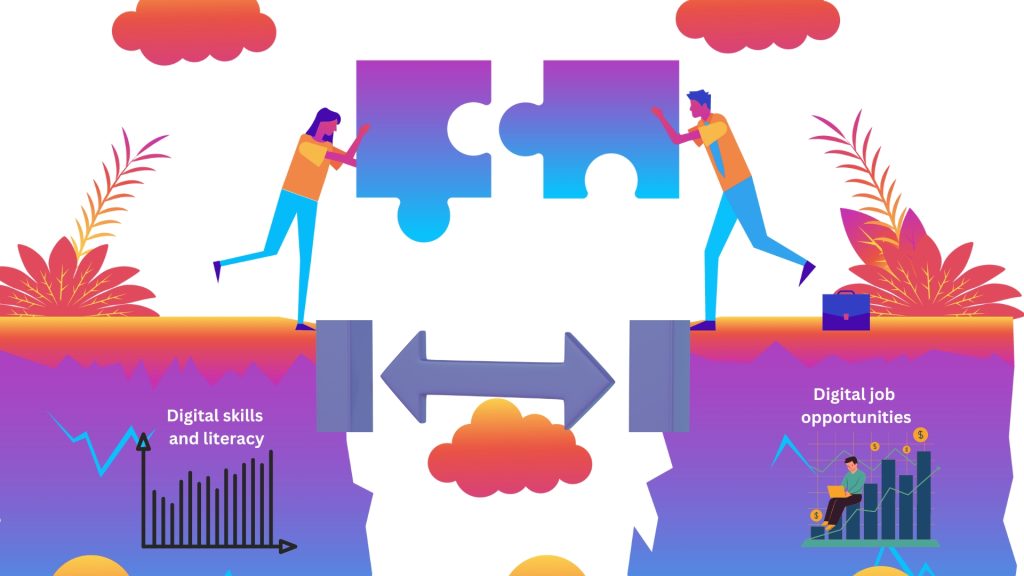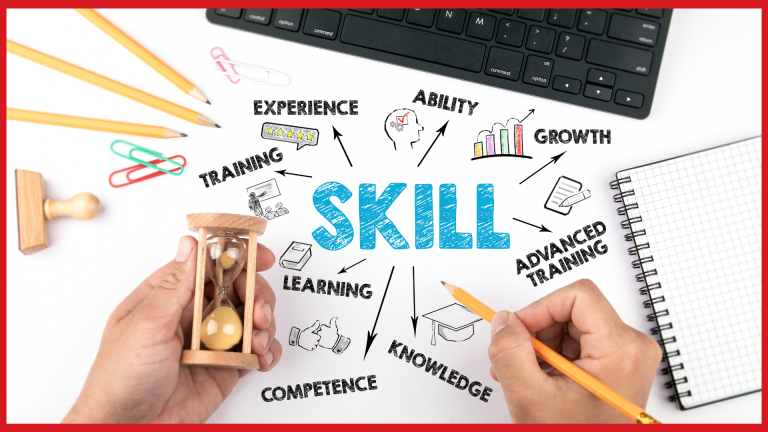
If we take Generative AI as an example, it’s a new and exciting technology that is gaining a lot of attention. Although it shows promise, it will take time to fully realize its benefits. Businesses and society as a whole face significant challenges in effectively managing the risks associated with generative AI, identifying the skills and abilities the workforce will require, and reevaluating important business processes like skill development and training.
The oversupply of digital jobs can be attributed to several factors:
- Technological advancements: Rapid advancements in technology have led to the creation of new digital roles and increased demand for digital skills across industries. The proliferation of internet connectivity, cloud computing, artificial intelligence, and automation has created a need for professionals who can leverage these technologies effectively.
- Digital transformation: Organizations are increasingly embracing digital transformation to stay competitive in the digital age. This shift requires hiring professionals with expertise in areas such as software development, data analytics, cybersecurity, digital marketing, and user experience design. As a result, the demand for digital talent has surged.
- Globalization and remote work: With the rise of remote work and globalization, geographical boundaries are no longer significant barriers. Companies can access a global talent pool and hire digital professionals from anywhere in the world. This has expanded the supply of digital jobs, as remote work opportunities are not limited by local talent availability.
- Shift in consumer behavior: Consumer behavior has evolved significantly with the widespread adoption of digital technologies. Businesses are adapting to meet customer expectations, resulting in a surge in demand for digital roles such as e-commerce specialists, social media managers, digital content creators, and customer experience analysts.
- Government and industry initiatives: Many governments and industry bodies are actively promoting digital skills and encouraging the growth of the digital economy. This focus on digitalization and the development of digital infrastructure has led to increased job opportunities in the digital sector.
It is important to note that while there may be an oversupply of digital jobs, there is often a shortage of individuals with the right skills and expertise to fill these positions. This highlights the need for ongoing efforts to bridge the digital skills gap and ensure a match between the supply and demand of digital talent.
The Strategy

Addressing the gap between the oversupply of digital jobs and the under supply of talent in Africa requires a multi-faceted approach. Here are a few strategies that can help:
- Promote digital skills education: Invest in digital skills training programs and initiatives at various levels, including schools, universities, vocational training centers, and online platforms. This can help equip individuals with the necessary skills for digital jobs.
- Foster partnerships and collaborations: Encourage collaborations between governments, educational institutions, private sector companies, and NGOs. These partnerships can help develop tailored training programs, mentorship opportunities, and internships to bridge the talent gap.
- Enhance entrepreneurship and innovation: Support the growth of startups and innovation hubs that focus on digital technologies. Foster an environment conducive to entrepreneurship, provide funding opportunities, and create networks for knowledge sharing and mentorship.
- Improve internet connectivity and infrastructure: Expand access to affordable and reliable internet connectivity, particularly in rural areas. This will enable more individuals to access digital education and remote work opportunities.
- Encourage diversity and inclusion: Promote the inclusion of underrepresented groups, such as women and marginalized communities, in the digital sector. Create initiatives that provide equal opportunities and support for all aspiring digital professionals.
- Align education with industry needs: Collaborate with industry leaders to identify the specific skills and competencies in demand. Update curricula and educational programs accordingly to ensure graduates are better prepared for the job market.
- Foster a culture of lifelong learning: Encourage continuous upskilling and reskilling to keep up with the evolving digital landscape. Provide access to online learning platforms and encourage professionals to upgrade their skills regularly.
By working together, it is possible to bridge this gap and unlock the potential of the digital economy in Africa. This requires a sustained effort involving governments, educational institutions, private sector organizations, and the individuals themselves. Take a look at the Botswana is doing through the Botswana Digital Innovation Hub (BDIH)

Calling All Digital Innovators and Change Makers!
Are you passionate about closing the digital divide and empowering the next generation of Africa? Are you driven to help small and medium-sized enterprises (SMEs) thrive in the digital era? Join our initiative to make a meaningful impact in the world of digital skills and transformation!
We are a team of digital skills experts and trainers with a vision to bridge the gap and equip youths with in-demand digital skills while enabling SMEs to leverage technology for growth and competitive advantage. We believe that by partnering together, we can create a powerful force for change.
Partner with us in the following streams:
- Youth Empowerment: Collaborate on designing and delivering digital literacy programs and workshops for young people, preparing them for the digital age and equipping them with the skills needed for future success.
- SME Digital Transformation: Work hand in hand with SMEs to develop and implement effective digital strategies, helping them harness the potential of technology to boost their growth, productivity, and competitiveness.
- Resource Sharing: Share your expertise, resources, or industry insights to enrich our programs and initiatives, making a lasting impact on the digital skills landscape and SME ecosystem.
Together, we can empower the next generation, transform businesses, and drive societal change through digital literacy and innovation. Join us today by reaching out to our team and becoming a part of this exciting journey. Together, let’s shape a future where everyone can thrive in the digital world.
Contact us at [email protected] or visit our website to learn more about our vision and how you can partner with us to make a difference. Together, we can close the digital divide and create a brighter future for all.




[…] Bridging the digital divide in Africa requires concerted efforts and collaboration among various stakeholders. […]
Artificial Intelligence is like the brainpower behind many technologies. It helps machines think and learn, much like humans do. This makes things work smarter and faster, from our phones to cars. AI also helps computers understand what we say and see, making them more useful and interactive. It’s like having a tech-savvy sidekick that makes everything cooler and easier.